The 2018 Community Read: Globalized Compassion

This past year, for many Americans, featured some of the most notable events of social upheaval in recent memory: the Women’s March, the March for Science, Black Lives Matter, the immigration ban protests, and the largest youth protest since the Vietnam War, the March for Our Lives. Thus, it is quite timely that this year’s Centre County Reads selection, Sunil Yapa’s bestselling novel Your Heart is a Muscle the Size of a Fist, revolves around the motivations for civil disobedience. Set during the 1999 Seattle World Trade Organization protests, the book explores the perspectives of seven characters. The novel’s roster includes three protestors, three police officers, and a delegate from Sri Lanka. Ultimately, the book provides insight into the complexity of the event and, most importantly, the uniting power of empathy.
Centre County Reads, a program coordinated by CALS, the downtown Schlow Library, and the Centre County Library System, aims to encourage public discussion around a single book. Given that Yapa is a Stage College native and Penn State alum, this year’s selection was particularly effective at bringing together members of the university and local community.
The month-long series of events kicked off at the Centre County Library and Historical Museum with a knit-a-thon on 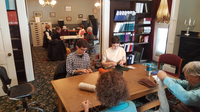 February 10th. Inspired by the “medics” in the novel who wrapped scarves and bandanas around the faces of their fellow protestors as protection from tear gas, participants in the event knitted scarves and other garments for Housing Transitions, a nonprofit organization that provides housing programs and services to those in need.
February 10th. Inspired by the “medics” in the novel who wrapped scarves and bandanas around the faces of their fellow protestors as protection from tear gas, participants in the event knitted scarves and other garments for Housing Transitions, a nonprofit organization that provides housing programs and services to those in need.
Then on February 27th, CALS hosted a roundtable discussion on the topic “What is Activist Literature?” in Mann Assembly Room in Paterno Library. Consisting of four panelists, the roundtable used Yapa’s book as 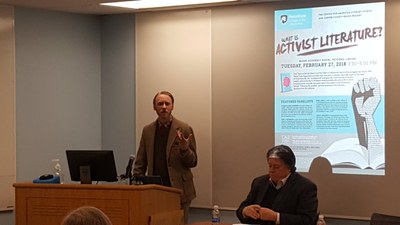 a touchstone to discuss topics such as the “protest” novel, the World Trade Organization protests, and the definition(s) of activism. Charles Andrews, Associate Professor of English at Whitworth University in Spokane, Washington, framed the discussion by urging the audience to consider how we might define the requirements and effectiveness of a “protest novel” and whether (or where) Yapa’s novel falls under such a rubric. Rose Luqui, a PhD candidate in the College of Communications at Penn State, discussed the social responsibilities of the media and her own first-hand experiences in covering the WTO protests in Seattle as a journalist. John D. McCarthy, Distinguished Professor in the Department of Sociology and Criminology at Penn State, elaborated on the origins of the Seattle protests and the varying organizations and groups that participated. Sarah J. Grossman, a poet and visiting fellow at the Center for Humanities and Information at Penn State, focused on the message of care and compassion in Yapa’s novel. Following their remarks, the panelists engaged in a dynamic Q&A session with the audience.
a touchstone to discuss topics such as the “protest” novel, the World Trade Organization protests, and the definition(s) of activism. Charles Andrews, Associate Professor of English at Whitworth University in Spokane, Washington, framed the discussion by urging the audience to consider how we might define the requirements and effectiveness of a “protest novel” and whether (or where) Yapa’s novel falls under such a rubric. Rose Luqui, a PhD candidate in the College of Communications at Penn State, discussed the social responsibilities of the media and her own first-hand experiences in covering the WTO protests in Seattle as a journalist. John D. McCarthy, Distinguished Professor in the Department of Sociology and Criminology at Penn State, elaborated on the origins of the Seattle protests and the varying organizations and groups that participated. Sarah J. Grossman, a poet and visiting fellow at the Center for Humanities and Information at Penn State, focused on the message of care and compassion in Yapa’s novel. Following their remarks, the panelists engaged in a dynamic Q&A session with the audience.
To coincide with this year’s events, CALS sponsored its annual writing contest under the theme of “The Art of Protest.” Writers from Centre County and abroad submitted entries representing or enacting “protest” in the categories of fiction, poetry, short nonfiction, and writing by authors under the age of 18. Also, for the first time this year, the Central 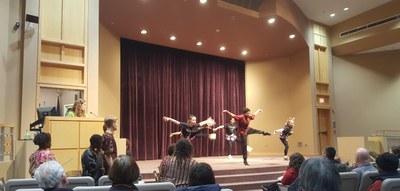 Pennsylvania Festival of the Arts sponsored an art contest on the same “Art of Protest” theme. The winners of both the writing and art contests were announced on March 21st at “An Evening with Sunil Yapa” in Foster Auditorium, where WPSU’s Emily Reddy conducted an interview with the first-time novelist. Prior to Yapa’s appearance on stage, Roots of Life, an African-inspired dance ensemble comprised of State College Area School District students and co-directed by PSU Professor of Theatre and Dance Kikora Franklin and SCASD Learning Enrichment Coordinator Debra Daggs, opened the event with an interpretive dance of Yapa’s novel.
Pennsylvania Festival of the Arts sponsored an art contest on the same “Art of Protest” theme. The winners of both the writing and art contests were announced on March 21st at “An Evening with Sunil Yapa” in Foster Auditorium, where WPSU’s Emily Reddy conducted an interview with the first-time novelist. Prior to Yapa’s appearance on stage, Roots of Life, an African-inspired dance ensemble comprised of State College Area School District students and co-directed by PSU Professor of Theatre and Dance Kikora Franklin and SCASD Learning Enrichment Coordinator Debra Daggs, opened the event with an interpretive dance of Yapa’s novel.
During the interview, Yapa revealed that he wrote most of the published version of the book at his father’s home in 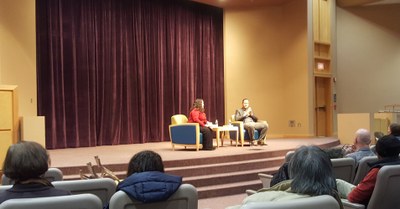 Centre County after having lost the original 600-page draft when his laptop was stolen from a hotel room. Citing the event as a blessing in disguise, Yapa claims that the theft provided an impetus to rewrite a leaner, meaner version of the book that only featured seven characters, not fifty. Yapa also made sure to stress that much of the book’s content was inspired by his travels and his fascination with how different the lives of people in the developing world are to his own. To provide the audience with an example, Yapa described how, when he lived outside of Santiago, Chile, he witnessed candlelight seep through the cracks of family shacks at night. Yapa, similarly, described his experiences with the publishing industry as a first-time novelist, and the stream of rejections (even from friends in the industry) that he experienced before finding his agent. When asked about the topic of his next book, Yapa was quick to reply, “That’s top secret.”
Centre County after having lost the original 600-page draft when his laptop was stolen from a hotel room. Citing the event as a blessing in disguise, Yapa claims that the theft provided an impetus to rewrite a leaner, meaner version of the book that only featured seven characters, not fifty. Yapa also made sure to stress that much of the book’s content was inspired by his travels and his fascination with how different the lives of people in the developing world are to his own. To provide the audience with an example, Yapa described how, when he lived outside of Santiago, Chile, he witnessed candlelight seep through the cracks of family shacks at night. Yapa, similarly, described his experiences with the publishing industry as a first-time novelist, and the stream of rejections (even from friends in the industry) that he experienced before finding his agent. When asked about the topic of his next book, Yapa was quick to reply, “That’s top secret.”
Yapa continued to share his anecdotes on writing the following evening, March 22nd, at the Alumni Lounge in the Nittany Lion Inn. As a part of the Mary E. Rolling Reading Series, Yapa read selections of his novel to an audience, commenting 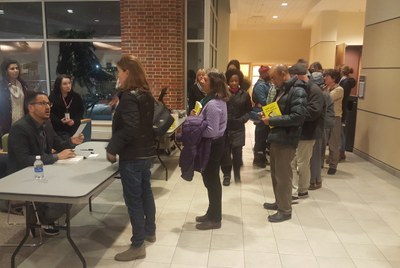 on specific inspirations as well as his research sources, which included police scanner recordings from the 1999 WTO protests. Concluding both of the events on the 21st and 22nd with a popular book signing, Yapa left the community with a message of hope and a reminder of the impact empathy can have on improving the world, a particularly resonant message in today’s bipartisan political landscape.
on specific inspirations as well as his research sources, which included police scanner recordings from the 1999 WTO protests. Concluding both of the events on the 21st and 22nd with a popular book signing, Yapa left the community with a message of hope and a reminder of the impact empathy can have on improving the world, a particularly resonant message in today’s bipartisan political landscape.
Sunil Yapa’s Your Heart is a Muscle the Size of a Fist proved to draw extensive participation from both the local community and university, laying the groundwork for discussions around topics such as globalization and the role of protest in society. Building on the program’s winning partnership between CALS and the Centre County libraries, this year’s slate of events marked yet another successful year for Centre County Reads.

This past year, for many Americans, featured some of the most notable events of social upheaval in recent memory: the Women’s March, the March for Science, Black Lives Matter, the immigration ban protests, and the largest youth protest since the Vietnam War, the March for Our Lives. Thus, it is quite timely that this year’s Centre County Reads selection, Sunil Yapa’s bestselling novel Your Heart is a Muscle the Size of a Fist, revolves around the motivations for civil disobedience. Set during the 1999 Seattle World Trade Organization protests, the book explores the perspectives of seven characters. The novel’s roster includes three protestors, three police officers, and a delegate from Sri Lanka. Ultimately, the book provides insight into the complexity of the event and, most importantly, the uniting power of empathy.
Centre County Reads, a program coordinated by CALS, the downtown Schlow Library, and the Centre County Library System, aims to encourage public discussion around a single book. Given that Yapa is a Stage College native and Penn State alum, this year’s selection was particularly effective at bringing together members of the university and local community.
The month-long series of events kicked off at the Centre County Library and Historical Museum with a knit-a-thon on  February 10th. Inspired by the “medics” in the novel who wrapped scarves and bandanas around the faces of their fellow protestors as protection from tear gas, participants in the event knitted scarves and other garments for Housing Transitions, a nonprofit organization that provides housing programs and services to those in need.
February 10th. Inspired by the “medics” in the novel who wrapped scarves and bandanas around the faces of their fellow protestors as protection from tear gas, participants in the event knitted scarves and other garments for Housing Transitions, a nonprofit organization that provides housing programs and services to those in need.
Then on February 27th, CALS hosted a roundtable discussion on the topic “What is Activist Literature?” in Mann Assembly Room in Paterno Library. Consisting of four panelists, the roundtable used Yapa’s book as  a touchstone to discuss topics such as the “protest” novel, the World Trade Organization protests, and the definition(s) of activism. Charles Andrews, Associate Professor of English at Whitworth University in Spokane, Washington, framed the discussion by urging the audience to consider how we might define the requirements and effectiveness of a “protest novel” and whether (or where) Yapa’s novel falls under such a rubric. Rose Luqui, a PhD candidate in the College of Communications at Penn State, discussed the social responsibilities of the media and her own first-hand experiences in covering the WTO protests in Seattle as a journalist. John D. McCarthy, Distinguished Professor in the Department of Sociology and Criminology at Penn State, elaborated on the origins of the Seattle protests and the varying organizations and groups that participated. Sarah J. Grossman, a poet and visiting fellow at the Center for Humanities and Information at Penn State, focused on the message of care and compassion in Yapa’s novel. Following their remarks, the panelists engaged in a dynamic Q&A session with the audience.
a touchstone to discuss topics such as the “protest” novel, the World Trade Organization protests, and the definition(s) of activism. Charles Andrews, Associate Professor of English at Whitworth University in Spokane, Washington, framed the discussion by urging the audience to consider how we might define the requirements and effectiveness of a “protest novel” and whether (or where) Yapa’s novel falls under such a rubric. Rose Luqui, a PhD candidate in the College of Communications at Penn State, discussed the social responsibilities of the media and her own first-hand experiences in covering the WTO protests in Seattle as a journalist. John D. McCarthy, Distinguished Professor in the Department of Sociology and Criminology at Penn State, elaborated on the origins of the Seattle protests and the varying organizations and groups that participated. Sarah J. Grossman, a poet and visiting fellow at the Center for Humanities and Information at Penn State, focused on the message of care and compassion in Yapa’s novel. Following their remarks, the panelists engaged in a dynamic Q&A session with the audience.
To coincide with this year’s events, CALS sponsored its annual writing contest under the theme of “The Art of Protest.” Writers from Centre County and abroad submitted entries representing or enacting “protest” in the categories of fiction, poetry, short nonfiction, and writing by authors under the age of 18. Also, for the first time this year, the Central  Pennsylvania Festival of the Arts sponsored an art contest on the same “Art of Protest” theme. The winners of both the writing and art contests were announced on March 21st at “An Evening with Sunil Yapa” in Foster Auditorium, where WPSU’s Emily Reddy conducted an interview with the first-time novelist. Prior to Yapa’s appearance on stage, Roots of Life, an African-inspired dance ensemble comprised of State College Area School District students and co-directed by PSU Professor of Theatre and Dance Kikora Franklin and SCASD Learning Enrichment Coordinator Debra Daggs, opened the event with an interpretive dance of Yapa’s novel.
Pennsylvania Festival of the Arts sponsored an art contest on the same “Art of Protest” theme. The winners of both the writing and art contests were announced on March 21st at “An Evening with Sunil Yapa” in Foster Auditorium, where WPSU’s Emily Reddy conducted an interview with the first-time novelist. Prior to Yapa’s appearance on stage, Roots of Life, an African-inspired dance ensemble comprised of State College Area School District students and co-directed by PSU Professor of Theatre and Dance Kikora Franklin and SCASD Learning Enrichment Coordinator Debra Daggs, opened the event with an interpretive dance of Yapa’s novel.
During the interview, Yapa revealed that he wrote most of the published version of the book at his father’s home in  Centre County after having lost the original 600-page draft when his laptop was stolen from a hotel room. Citing the event as a blessing in disguise, Yapa claims that the theft provided an impetus to rewrite a leaner, meaner version of the book that only featured seven characters, not fifty. Yapa also made sure to stress that much of the book’s content was inspired by his travels and his fascination with how different the lives of people in the developing world are to his own. To provide the audience with an example, Yapa described how, when he lived outside of Santiago, Chile, he witnessed candlelight seep through the cracks of family shacks at night. Yapa, similarly, described his experiences with the publishing industry as a first-time novelist, and the stream of rejections (even from friends in the industry) that he experienced before finding his agent. When asked about the topic of his next book, Yapa was quick to reply, “That’s top secret.”
Centre County after having lost the original 600-page draft when his laptop was stolen from a hotel room. Citing the event as a blessing in disguise, Yapa claims that the theft provided an impetus to rewrite a leaner, meaner version of the book that only featured seven characters, not fifty. Yapa also made sure to stress that much of the book’s content was inspired by his travels and his fascination with how different the lives of people in the developing world are to his own. To provide the audience with an example, Yapa described how, when he lived outside of Santiago, Chile, he witnessed candlelight seep through the cracks of family shacks at night. Yapa, similarly, described his experiences with the publishing industry as a first-time novelist, and the stream of rejections (even from friends in the industry) that he experienced before finding his agent. When asked about the topic of his next book, Yapa was quick to reply, “That’s top secret.”
Yapa continued to share his anecdotes on writing the following evening, March 22nd, at the Alumni Lounge in the Nittany Lion Inn. As a part of the Mary E. Rolling Reading Series, Yapa read selections of his novel to an audience, commenting  on specific inspirations as well as his research sources, which included police scanner recordings from the 1999 WTO protests. Concluding both of the events on the 21st and 22nd with a popular book signing, Yapa left the community with a message of hope and a reminder of the impact empathy can have on improving the world, a particularly resonant message in today’s bipartisan political landscape.
on specific inspirations as well as his research sources, which included police scanner recordings from the 1999 WTO protests. Concluding both of the events on the 21st and 22nd with a popular book signing, Yapa left the community with a message of hope and a reminder of the impact empathy can have on improving the world, a particularly resonant message in today’s bipartisan political landscape.
Sunil Yapa’s Your Heart is a Muscle the Size of a Fist proved to draw extensive participation from both the local community and university, laying the groundwork for discussions around topics such as globalization and the role of protest in society. Building on the program’s winning partnership between CALS and the Centre County libraries, this year’s slate of events marked yet another successful year for Centre County Reads.